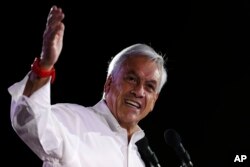Billionaire Sebastian Pinera once looked set to easily win Chile’s presidential runoff and swing the country back to the right. Now, the election’s outcome is so uncertain analysts say the nation could remain on its center-left path.
Pinera, who previously governed Chile from 2010 to 2014, won the first round of voting in November with 36 percent support, below expectations from pollsters. His center-left challenger Sen. Alejandro Guillier garnered 22 percent. Pinera’s failure to get an outright majority forced Sunday’s runoff between the two candidates, the top vote-getters in a crowded field.
Polls are banned in the weeks ahead of the election, but analysts say that based on the last polls released and trends seen, it appears the race is now up for grabs.
“What it is showing, though, is that there’s practically a tie between the two of them,” said Javier Sajuria, a lecturer in politics at Queen Mary University of London.
Economic growth not enough
Pinera oversaw annual economic growth averaging 5.3 percent during his first term. But the 68-year-old conservative struggled to deal with massive protests over inequality and education rights and left office with low popularity ratings.
“Since (Guillier) is not very popular, he has tried to turn the election into a referendum on Pinera. As a former president, Pinera has high negatives,” said political scientist Patricio Navia of New York University.
Even so, an economic slump in the world’s top copper-producing nation under outgoing, center-left President Michelle Bachelet seemed to have cast a retrospective glow over Pinera leading up to the first round.
Scare tactic backfires
But in recent weeks the race has polarized, with Pinera comparing Guillier to Nicolas Maduro, the president of crisis-riddled Venezuela, a scare tactic that seems to have backfired.
“In fact, it seems to have activated voters in the Broad Front (hard-left coalition) who began to endorse Guillier,” said Kenneth Bunker, director of the electorate program at Chile’s Central University.
Pinera promises to launch an aggressive investment plan to combat the slowdown that has seen growth average about 1.8 percent yearly under Bachelet. The Harvard-educated entrepreneur is also proposing to cut taxes on business to promote growth.
Guillier, a 64-year-old journalist, has vowed to continue Bachelet’s plan to increase corporate taxes to partly pay for an education overhaul, improvements to the pension and health care system and the development of alternative sources of energy to lower investment costs.
To Pepe Auth, a Chilean electoral expert, “this will be the most uncertain election in the history of Chile.”












